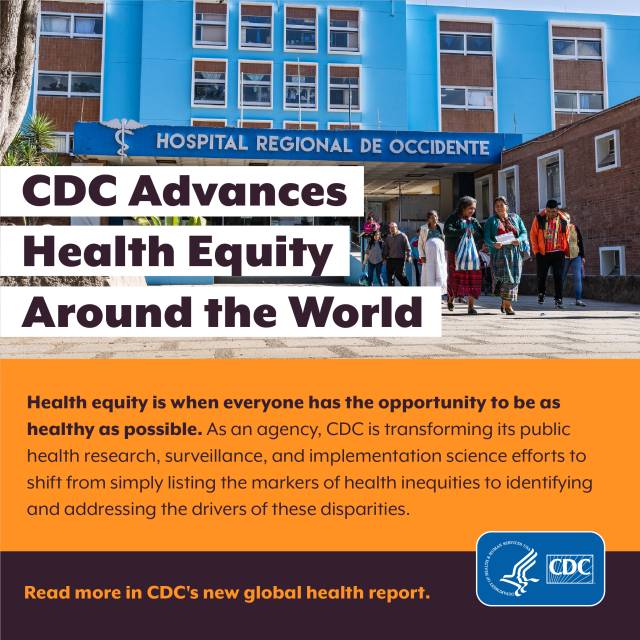You are here
New CDC Report: Striving Toward Global Health Equity
When it comes to health, it's important to recognize how interconnected the world is. No nation, including the United States, can be truly safe until all countries have core public health capabilities and reliable health systems to protect all communities regardless of their social, political, economic or environmental circumstances. The Centers for Disease Control and Prevention (CDC)’s newly released Global Health Annual Report, “CDC Advances Health Equity Around the World,” emphasizes the importance of promoting health equity and minimizing health disparities across the globe.
Global health inequities arise from many factors, including lack of access to healthcare, the rise of drug-resistant pathogens, gaps in immunity to vaccine-preventable diseases and the impacts of the changing climate. To address these inequities, CDC’s Global Health Equity Strategy takes a human rights approach focused on improving the availability, accessibility, acceptability and quality of global health programs. The strategy recognizes that there are multiple ways to pursue the right to health, and it sets specific goals to help countries eliminate health disparities.
The CDC Foundation has worked with CDC for more than 25 years, building public-private partnerships to identify and resolve common health priorities and advance health equity worldwide. Through these partnerships, we strive to advance health equity by focusing on changing the systems, both formal and informal, that have created and perpetuated global disparities in health outcomes and catalyzing cross-sector collaboration for sustained impact.
As highlighted in CDC’s report, the CDC Foundation partners with CDC on a variety of key priority areas that include building the capacity to detect, respond to and prevent the spread of diseases like malaria and expanding access to critical public health services and infrastructure in countries like Haiti and Ukraine during times of crisis. The report also features our partnership with CDC and the Bill & Melinda Gates Foundation to strengthen the capacity of malaria laboratories and experts on the African continent focused on monitoring malaria drug resistance, equipping a laboratory in Senegal to offer the same trainings and services as CDC’s Malaria Lab. This partnership supports global efforts to ensure that malaria therapies retain their efficacy and demonstrates who we work to ensure that the systems for addressing infectious diseases like malaria are in place in the countries facing the greatest burden of those diseases.
The report also features CDC and CDC Foundation’s research, in partnership with the Bill & Melinda Gates Foundation, on the efficacy of the pneumococcal conjugate vaccine (PCV) in Mozambique and Burkina Faso. This research will inform future vaccine policy that may help these countries achieve higher and more equitable PCV coverage and save the lives of thousands of children.
The global health community has renewed its commitment to lessening the burden of these and other diseases on vulnerable populations all over the world, and we believe that our greatest impact will be made through collaboration. Together with CDC, we aim to create a healthier and safer world that is better prepared to equitably address the next global health challenge and help people achieve their healthiest potential.
Read the full report here.

